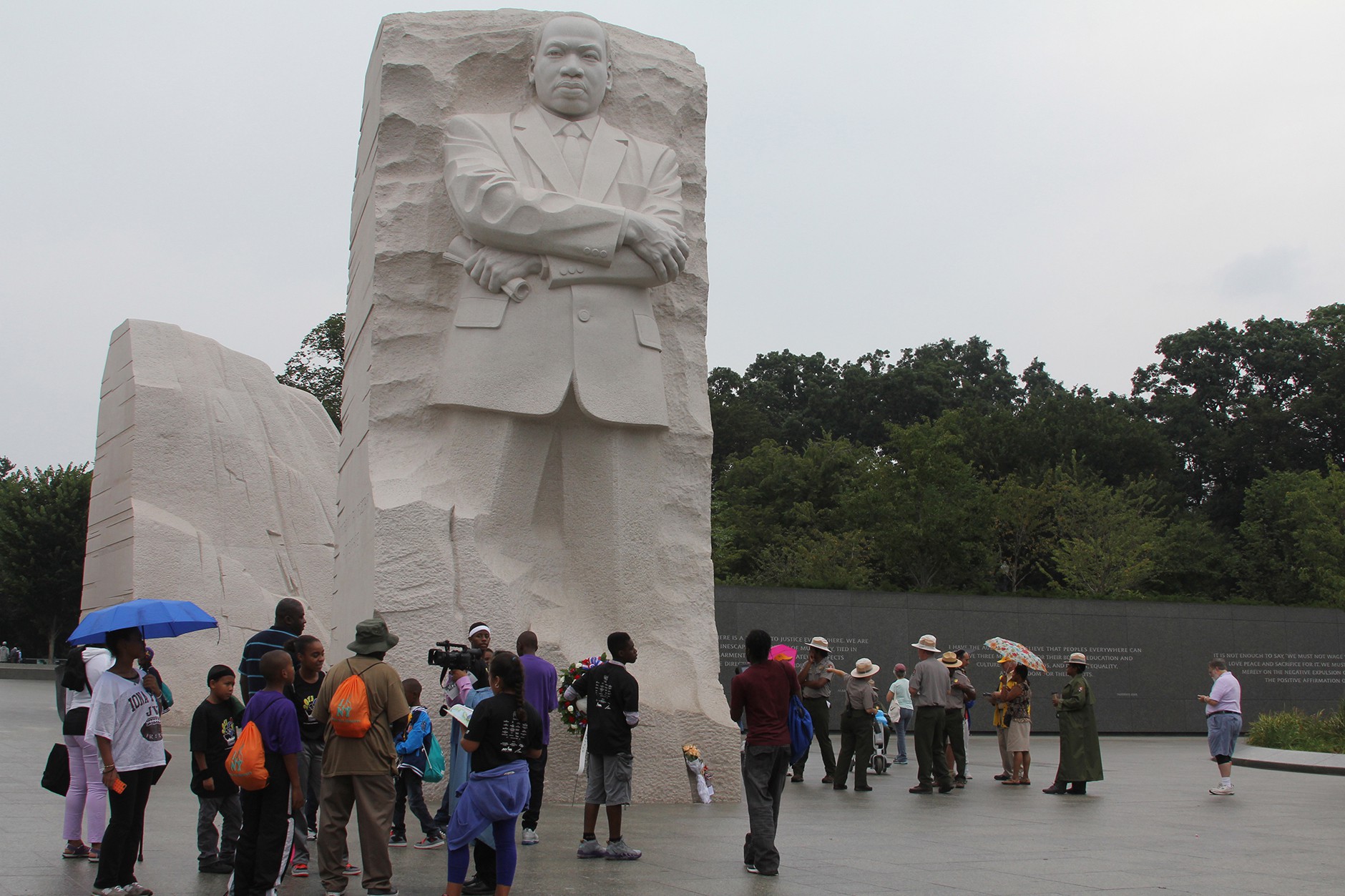A group of visitors from New York gathers at the Martin Luther King
Jr. Memorial on the 50th anniversary of King’s historic March on
Washington, which was being celebrated nearby on the Mall. (Cronkite
News Service photo by Chad Garland)
By JACK FITZPATRICK Cronkite News Service
WASHINGTON – Presidents Barack Obama, Bill Clinton and Jimmy Carter all cited voter suppression as a major challenge facing minorities 50 years after the March on Washington and Martin Luther King’s “I Have a Dream” speech.
While none of the three mentioned Arizona by name, state Democrats and voting-rights advocates said the state was “absolutely” in the minds of Wednesday’s speakers.
“Especially when commemorating the March on Washington and the ‘I Have a Dream’ speech, and considering how important voting rights were to Dr. King, we should be making voting easier and more accessible to all Americans,” said DJ Quinlan, executive director of the Arizona Democratic Party. “And Republicans have been working in the opposite direction.”
But a Republican Party official said that what Quinlan calls voter suppression is a demand for election integrity that has been pushed by state voters.
“I can’t address what Martin Luther King Jr. would have said or might have said about 21st-century Arizona,” said Tim Sifert, an Arizona Republican Party spokesman. “But what we’ve got in Arizona is, the voter-approved law simply says, when you register to vote, you’ve got to prove citizenship.”
The current and former presidents’ comments came at a daylong event celebrating the 50th anniversary of the March on Washington and King’s historic speech.
All three mentioned barriers to minorities voting, and Carter specifically mentioned the June Supreme Court ruling that struck down Section 4 of the Voting Rights Act, which applies federal oversight of election activities in states with a history of discrimination. Arizona was one of those states.
“I believe we all know how Dr. King would have reacted to the new ID requirements to exclude certain voters, especially African Americans,” Carter said. “I think we all know how Dr. King would have reacted to the Supreme Court striking down a crucial part of the Voting Rights Act just recently passed overwhelmingly by Congress.”
Arizona is also suing the federal government over a portion of Proposition 200, the state law that requires proof of citizenship to register to vote. The Supreme Court ruled this summer that the state law is trumped by federal law, which only requires an applicant to swear he is a citizen.
Arizona Attorney General Tom Horne said in an Aug. 21 press release that his office is suing the Election Assistance Commission over the state’s right to determine what identification people need to show when registering to vote. Horne is arguing that it is unconstitutional for the federal government to stop the state from requiring proof of citizenship, regardless of which form voters use.
A spokeswoman for Horne said the office had no comment on Wednesday’s speeches.
Voter ID laws were one of several issues Obama, Clinton and Carter discussed, including gun control, inequality in the criminal justice system and unemployment among blacks.
“A great democracy does not make it harder to vote than to buy an assault weapon,” Clinton said.
Obama referenced voter ID laws briefly, saying that racial equality in America required vigilance, including “challenging those who erect new barriers to the vote.”
Francisco Heredia, national field director for voting rights group Mi Familia Vota, said Arizona is still erecting such barriers, pointing to a bill passed this year. He said HB 2305 creates further barriers for Arizona voters by making it illegal for employees or volunteers of political committees – including groups like Mi Familia Vota, he said – to collect early ballots.
“Obviously you have to be an eligible citizen to vote, that’s a given, but there shouldn’t be any barriers placed to voting,” Heredia said. “We’re seeing this across the country, and Arizona has unfortunately been on the forefront of many of these voter-ID laws, starting in 2004.”
A coalition of groups, including the state Democratic Party and Mi Familia Vota, is pushing for a voter referendum to overturn HB 2305.
By JACK FITZPATRICK Cronkite News Service
WASHINGTON – Presidents Barack Obama, Bill Clinton and Jimmy Carter all cited voter suppression as a major challenge facing minorities 50 years after the March on Washington and Martin Luther King’s “I Have a Dream” speech.
While none of the three mentioned Arizona by name, state Democrats and voting-rights advocates said the state was “absolutely” in the minds of Wednesday’s speakers.
“Especially when commemorating the March on Washington and the ‘I Have a Dream’ speech, and considering how important voting rights were to Dr. King, we should be making voting easier and more accessible to all Americans,” said DJ Quinlan, executive director of the Arizona Democratic Party. “And Republicans have been working in the opposite direction.”
But a Republican Party official said that what Quinlan calls voter suppression is a demand for election integrity that has been pushed by state voters.
“I can’t address what Martin Luther King Jr. would have said or might have said about 21st-century Arizona,” said Tim Sifert, an Arizona Republican Party spokesman. “But what we’ve got in Arizona is, the voter-approved law simply says, when you register to vote, you’ve got to prove citizenship.”
The current and former presidents’ comments came at a daylong event celebrating the 50th anniversary of the March on Washington and King’s historic speech.
All three mentioned barriers to minorities voting, and Carter specifically mentioned the June Supreme Court ruling that struck down Section 4 of the Voting Rights Act, which applies federal oversight of election activities in states with a history of discrimination. Arizona was one of those states.
“I believe we all know how Dr. King would have reacted to the new ID requirements to exclude certain voters, especially African Americans,” Carter said. “I think we all know how Dr. King would have reacted to the Supreme Court striking down a crucial part of the Voting Rights Act just recently passed overwhelmingly by Congress.”
Arizona is also suing the federal government over a portion of Proposition 200, the state law that requires proof of citizenship to register to vote. The Supreme Court ruled this summer that the state law is trumped by federal law, which only requires an applicant to swear he is a citizen.
Arizona Attorney General Tom Horne said in an Aug. 21 press release that his office is suing the Election Assistance Commission over the state’s right to determine what identification people need to show when registering to vote. Horne is arguing that it is unconstitutional for the federal government to stop the state from requiring proof of citizenship, regardless of which form voters use.
A spokeswoman for Horne said the office had no comment on Wednesday’s speeches.
Voter ID laws were one of several issues Obama, Clinton and Carter discussed, including gun control, inequality in the criminal justice system and unemployment among blacks.
“A great democracy does not make it harder to vote than to buy an assault weapon,” Clinton said.
Obama referenced voter ID laws briefly, saying that racial equality in America required vigilance, including “challenging those who erect new barriers to the vote.”
Francisco Heredia, national field director for voting rights group Mi Familia Vota, said Arizona is still erecting such barriers, pointing to a bill passed this year. He said HB 2305 creates further barriers for Arizona voters by making it illegal for employees or volunteers of political committees – including groups like Mi Familia Vota, he said – to collect early ballots.
“Obviously you have to be an eligible citizen to vote, that’s a given, but there shouldn’t be any barriers placed to voting,” Heredia said. “We’re seeing this across the country, and Arizona has unfortunately been on the forefront of many of these voter-ID laws, starting in 2004.”
A coalition of groups, including the state Democratic Party and Mi Familia Vota, is pushing for a voter referendum to overturn HB 2305.









No comments:
Post a Comment